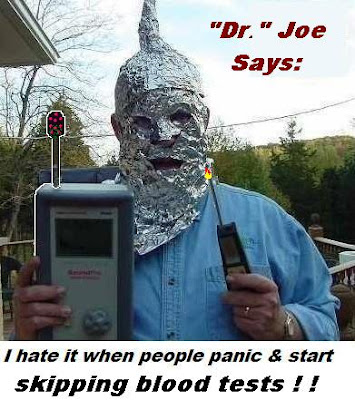
F A C T:
Thyrotropin or TSH is not used as a standalone screening indicator for thyroid disease.
Factors affecting TSH levels in a healthy adult are complex, and such a test is not given to otherwise healthy folks in the general population. Experts strongly disagree on just what "normal levels" of TSH are, and levels vary with age, being highest in infancy.The result of any solitary TSH test that finds either abnormally low, or abnormally high levels of TSH in a person with no symptoms is not telling, and tests of pituitary function, T3 & T4 hormone tests, an assay of iodine in the diet, a survey of lifestyle factors, possible ultrasound and biopsy tests and a search for symptoms and immediate causes must be given along with such a test to ascertain just why levels are either high or low. They may be either high or low for a host of reasons, from pituitary disease, to hyperthyroidism to hypothyroidism, to obesity, lack of exercise, simple goiter, or smoking.
---------------------------------------------
A thyrotropin test, by itself, IS given after thyroid removal surgery, to see if all residual thyroid tissue has been removed. This is its only stand-alone application.
---------------------------------------------
In the face of these limitations, and accepted medical practice vis-a-vis Thyroid Stimulating Hormone, or TSH, or thyrotropin ( all the same thing), what are we to make of non-medical applications of such a test to the general public, for no reason other than a speculative political theory? Are we seeing an unethical abuse of medicine, in the hopes of garnering contributions for a tax-free 501(c)3 business?
When apparent thyroid disease numbers began rising in the 1980's, Dr. H. Ruben Harach, a Canadian researcher, did a famous study, in which his team dissected the thyroid glands of recently deceased people with no trace of thyroid disease, and the team found that the general population contains a huge reservoir of tiny, previously undetectable thyroid nodules that were never going to cause cancer, but which were being diagnosed as precancerous, simply because the use of ultrasound and fine needle aspiration after about 1975 had allowed them to be found. ( LINK )
Harach's ground breaking research warned the medical community of the dangers inherent in diagnosis-by-test, as opposed to diagnosis by symptoms complained of by the patient. We see a similar revolution in the PSA test for prostate cancer in men, which is now known to unnecessarily subject healthy patients to anguish, lifestyle eradication, and maiming surgery, for no true clinical benefit.
The Harach study led to other investigations, in which it was found that the apparent rise in thyroid disease over two decades was a spurious set of false statistics, resulting from over-diagnosis, over-treatment, and lack of close clinical connections between doctor and patient. ( LINK )
The TSH test is now considered to be analogous to the PSA (Prostate Hormone) test in men, in giving false, misleading, and dangerous misinformation, when not tied to a full diagnostic workup by a doctor who is familiar with the patient. See this link, for a self help group championing this cause: click on:
( TSH PATIENTS COMPLAIN )
So, how do we judge an apparently amoral public relations stunt perpetrated by the tax-free Joseph Mangano "activism" group, offering stand-alone walk-in TSH tests to audience members at a Clearwater picnic? Could certain innocent, duped people be subjected to mental anguish, misdiagnosis, or even unneeded surgery, because the Mangano charity collection house wishes to ply a medical-flavored ploy to keep contributions coming in, and visibility high?
If Mangano had a medical license, he could lose it for such a scam. However, Mangano, who once called himself "Dr. Joseph Mangano" no longer poses as a practitioner. So why then "practice" faux "medicine" on concert audiences? Do we detect a certain unbalance at work here? A chronic, compulsive charlatanry?
Here is a quote from a New Zealand Health Website about bona-fide uses for the TSH test:
( LINK )
"Why It Is Done...
A test for thyroid-stimulating hormone (TSH) is done to:
* Find out whether the thyroid gland is working properly.
o An underactive thyroid gland (hypothyroidism) can cause symptoms such as weight gain, tiredness, dry skin, constipation, a feeling of being too cold, or frequent menstrual periods.
o An overactive thyroid (hyperthyroidism) can cause symptoms such as weight loss, rapid heart rate, nervousness, diarrhea, a feeling of being too hot, or irregular menstrual periods.
* Find the cause of an underactive thyroid gland (hypothyroidism). TSH levels can help determine whether hypothyroidism is due to a damaged thyroid gland or some other cause (such as a problem with the pituitary gland or the hypothalamus).
* Keep track of treatment with thyroid replacement medicine for people who have hypothyroidism.
* Keep track of thyroid gland function in people who are being treated for hyperthyroidism. This treatment may include antithyroid medicine, surgery, or radiation therapy.
* Double-check the diagnosis of an underactive thyroid gland in a newborn (congenital hypothyroidism)."
Proof that it is not simple....see:
( TSH COMPLEXITY )
Raised TSH levels, from allergies...see:
( FALSE ALARM )
For smoking raising TSH levels see:
( THE SMOKING CONNECTION )
For why a walk-in test is contraindicated....see:
( DANGERS OF MIS-TESTING )
For why universal testing is not used....see:
( WHEN TO NOT TEST )
For a relevant news story...see:
( PROSTATE MALPRACTICE )
For another related story...see:
( TESTS BOTCHED )

.
.